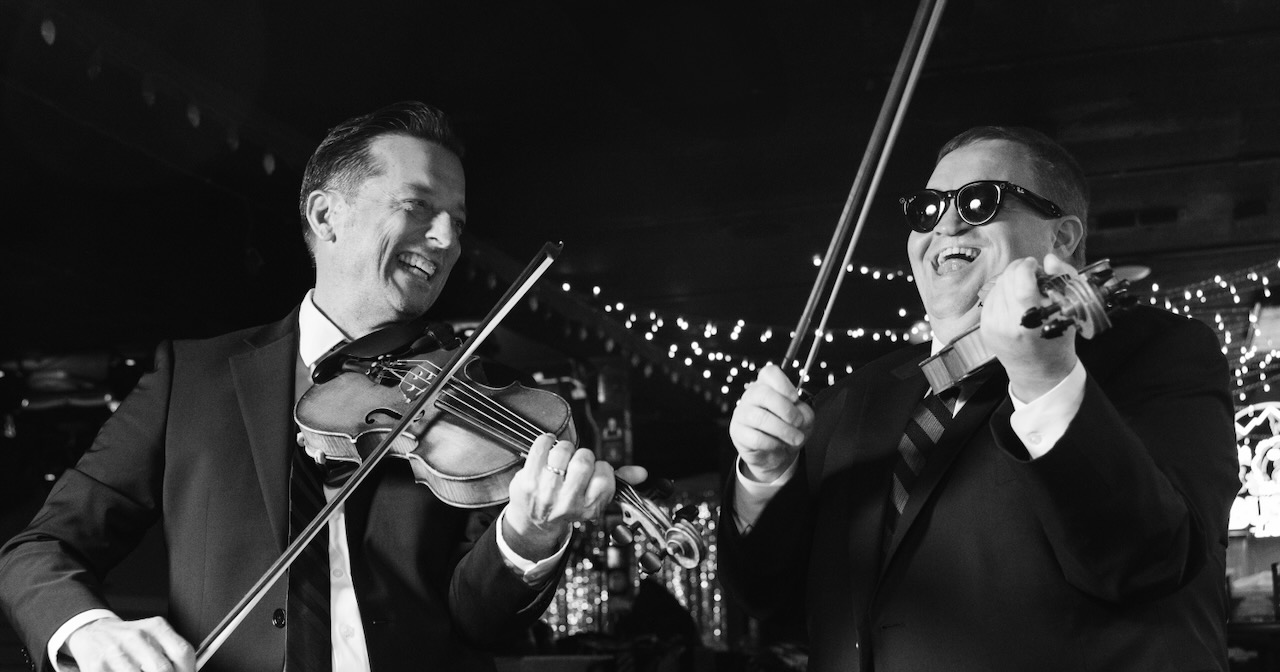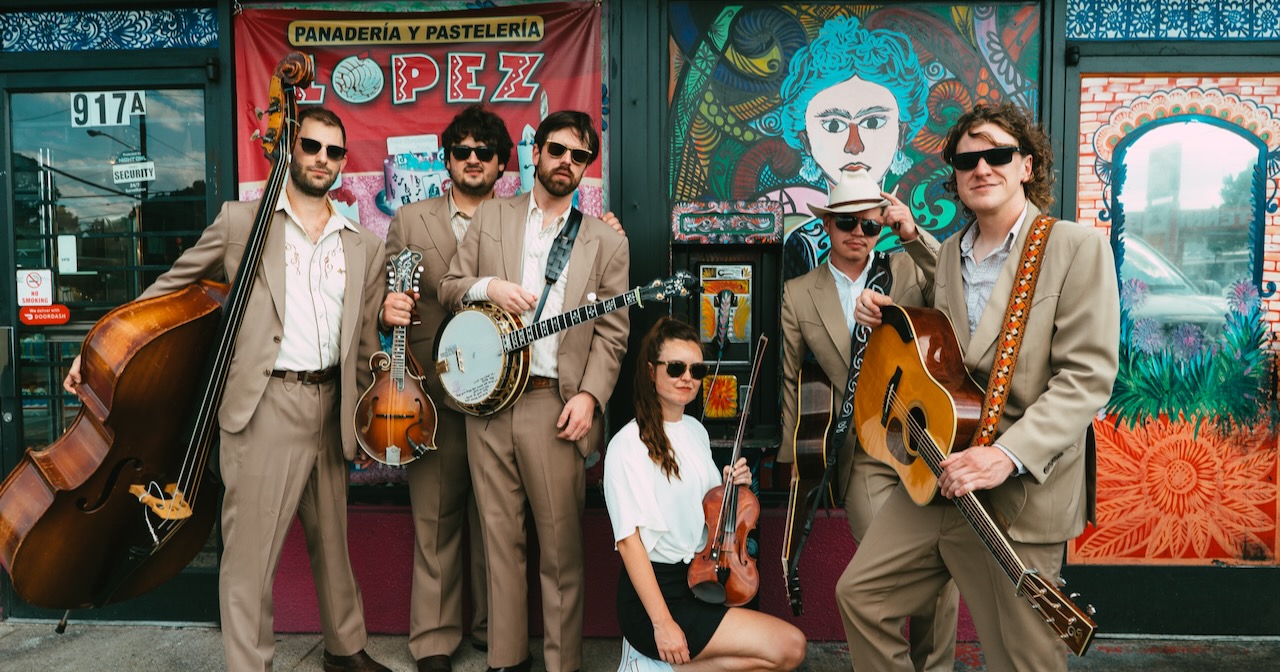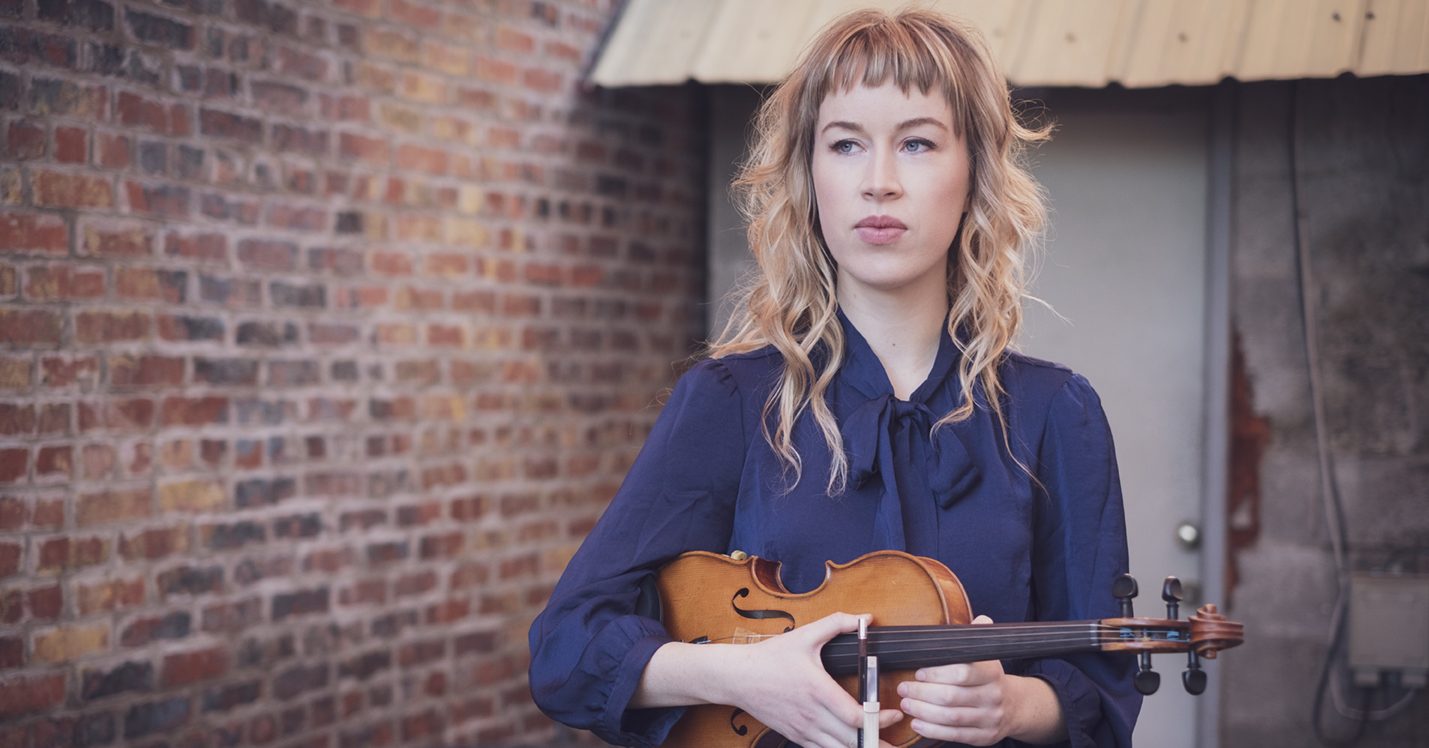Featuring Harry Clark on mandolin, James Kee on guitar, fiddler Maddie Denton, bassist/Dobro player Jeff Partin, and Cory Walker on banjo, East Nash Grass began as ragtag group of pickers blowing off steam at a honky-tonk in Madison, Tennessee, just northeast of Nashville proper. It has always been a band open to both unusual ideas and committed to the classic form. Still, their new album, All God’s Children, takes the metaphorical cake.
After winning the 2024 IBMA Award for New Artist of the Year, touring internationally, and even making their co-headline debut at Nashville’s Ryman Auditorium, All God’s Children feels like a joyful tribute to the many ways life gets good – and to bluegrass’s many salt-of-the-earth styles. With skillful traditional picking and a focus on diversity (both thematically and in the band’s tendency to share the spotlight at center stage), East Nash Grass deliver a truly spirit-satisfying album. Just don’t let its name fool you – this ain’t gospel.
“I enjoyed that it’s a little bit of a misnomer,” says Kee, with a touch of mischief in his voice. “We are a fairly traditional bluegrass band and we do some gospel music, but … anybody who knows us would know pretty immediately, it’s not a gospel album. I kind of liked that it would make somebody who doesn’t know our music take a second look.”
Out August 22 and featuring everything from good-old fashioned traveling songs to a reimagined West African folk tune, All God’s Children celebrates the coming together of worlds. James, Harry, and Maddie spoke with BGS from a Montana tour stop and explained how they reached their universally minded creative crossroads.
What’s the vibe with you guys these days? The last few years have been a bit of a Cinderella story and you’ve done so well. How are you feeling creatively?
Harry Clark: We’re in road mode right now. I feel like we were in a real creative mode around December when we were finishing the album and you kind of have to go into a different mode for … “Alright, let’s get through three weeks on the road in a van.” That’s a different kind of mindset.
But going into the album process, was there no pressure to change the way you’ve been doing things in the past – just because now there’s been a little more success?
HC: I feel like there are just ideas and things that seem to exist that we want to bring into life. That’s how the creative process has been for us. I wouldn’t call it aimless, but we kind of just let it happen on its own in terms – what songs people are bringing in and what the mood of those are. It’s just recording a record. It’s kind of like seasons of your life.
This one has a little bit of everything. You’ve got some new songs, a couple covers, and even a [modified] Liberian chant. Was this just kind of a cross section of everything the band is into right now?
Maddie Denton: I think everybody’s been getting into different stuff on their own. And everybody’s writing with other people, while we’re writing together. So I guess “cross section” is a good word for it. We just wanted to put together some songs that we liked.
How about thematically? It’s called All God’s Children and you guys say very clearly this is not a gospel record, but it does have a spiritual element, right? What do you mean by that?
James Kee: We debated a couple different titles. I was afraid that this traditional bluegrass crowd would hear that [title] and assume it was gospel, which would be an issue. And then once I kind of sunk my teeth in, I actually thought that [song, “All God’s Children,”] was the heart of the album, and it just seemed like the right title.
All the songs on it are a good showing of different walks of life. It’s not just one thought for each song. It’s not about the same person throughout each song. It’s different short stories throughout the album. It kind of goes hand in hand with “all of God’s children,” because it’s a bunch of different things. Not just one.
MD: It also came about after we had done some international travel as a band. Some of us had been to other countries, but not with the band, and then in February of last year we went to Ireland and Switzerland with East Nash Grass and this record started falling into place after that. And then later in the year we went to France. I think we got inspired by seeing some different folks and ways of life than what we were used to. There’s a small element of world music inspiration behind the record, too. So I think that comes from just traveling more.
You have always been a very inclusive-minded band, while also sticking pretty close to traditional bluegrass roots. When you started at Dee’s [Country Cocktail Lounge], was that kind of the goal?
HC: I feel like that’s where we all came from individually. Each and every one of us grew up going to these lawn chair snapping festivals where you go up and they have the same bands every year and there’s people out watching the show in their lawn chairs – sometimes sleeping [like] they’re dead. But there’s also this killer community of jamming that happens at these festivals, and you go and you jam with people and you just learn the repertoire. You get together with people you haven’t even met before, but who’ve been in the same places, and you can just all kind of speak the same language.
We were able to take it from there. We all have that same background from our childhoods of going to these places and these shared experiences. So when we got together, it was like we had been doing it for a long time. But everyone’s got new ideas, new energy coming from other places musically as well. … I think we all pull from that individually and it comes out sounding like traditional bluegrass, but at the same time, not really at all.
After winning the IBMA New Artist of the Year award, do you feel like that is more accepted in the bluegrass community nowadays?
HC: It’s art and it has to move … so it just seemed like the time to do our own thing. The most important part is always the music. I hope it stands the test of time and somebody else listening can look back 20 years from now and say it was a good guidepost throughout the evolution of bluegrass music. That is most important to us, as opposed to trying to fit into a certain box that has just been built many, many times.
You all do a really good job of sharing the spotlight. Different singers, different featured instruments. From a friendship perspective, what’s it like watching your bandmates do their thing every night?
MD: Man, it’s pretty cool. Everybody is such a good musician and such a good singer. I mean, even Cory can sing a little bit – he just doesn’t like to do it and play banjo at the same time. Everyone has a little special unique thing that makes them stand out.
HC: For me personally, everyone has something they do really well that I just can’t do. And when I get to see ‘em do that, I’m in awe. It’s inspiring when someone crushes something right in front of your face and you’re like, “Man, I dunno how they do that every time.”
JK: Also anything that’s a win for one person in the band is a win for the whole band, and that’s kind of how we’ve looked at it. It’s like it’s the sum of all parts.
The reason I ask is because you made your headline debut at the Ryman Auditorium a couple of weeks ago. What was that night like?
HC: It’s hard to describe. It’s the Mother Church. It’s truly my favorite venue to see a show, and now play a show. There’s no time like the first time … and it’s just such an honor to be up there, have our name up there, and have our own little night there.
There’s only a few places where once I get on stage, it hits me where I’m at and what I’m doing, and then I focus in on everything so close, and that never helps me out. To touch on the question you asked prior to this, one of the best parts about this band is there’s been times where I felt like I didn’t play a great show personally, but the band probably played one of its best shows, because everyone can step up and pick up weight. It really pays off when that team spirit comes out, because I do feel like that night at the Ryman I got up there and was in my head – because of this place. But as a band, the band crushed it. Once again. It was a great feeling.
Tell me a little bit about the story behind “All God’s Children.” It’s got this warm and fuzzy bluegrass feeling and then you’ve got some joyful children noises in there too. Where’s all this coming from?
MD: Well, that’s our buddy David Grier’s son Nash Grier. Nash helped us out with those joyful children noises.
JK: Yeah, Nash is seven and he’s fluent in Japanese and English.
MD: And he can play – I mean, probably any instrument, but I’ve seen him play fiddle. He’s crazy good, so everybody keep their eye open for old Nash Grier. He’s coming for everybody’s jobs in Nashville.
HC: That was a song that me and Christian Ward and Cory Walker wrote and I kind of had that phrase in mind. The idea behind the song was loosely based on real life, but at the same time, it kind of has that old-time limerick thing where you can take whatever the words are and use your imagination to make ‘em what you want it to mean.
How about “Jump Through the Window.” Is this one the Liberian chant? I think it speaks to the way you made all these songs your own that I can’t necessarily tell.
MD: Yeah! Our tour manager and my best pal, Brenna MacMillan, she grew up with some siblings adopted from Liberia, and they knew this song, this chant. It was like a thing that the Liberian kids over there knew. … Brenna came to me with this idea of like, “Hey, there’s this chant that I grew up hearing with my siblings and I think it would be cool bluegrass. Can you help me with it?”
Everybody spent time learning it because it’s kind of a weird thing, but we arranged it and everybody had really nice ideas. I think Jeff had some ideas at the end for those chord substitutions, and it just came together really nicely. Then we brought Brenna in to sing some harmony on it. There’s the part where we all are singing unison together, so Brenna is on that. The engineer of the record, Jake Stargel, also hopped on a mic and joined us in the little chant part. And James was the town elder singing the bass part.
That speaks to the inclusive nature of a set called All God’s Children, which you have done a few times here. I just wonder, what do you hope listeners take away from this batch of music?
HC: A bunch of merch. [Laughs]
MD: There’s a peacefulness to me about this record, and that comes from having seen some of the world and singing about those experiences and connectedness. For me, this record, it’s like we had to pull together to make it, and I want it to reach different types of folks and everybody feel connected.
HC: I remember when I was a teenager, I’d played bluegrass for eight years and it was becoming more and more the forefront of my life. And when I would hear something that hit me as new or fresh, it inspired me to want to do something new and fresh, and get out of the box a little bit. I hope we can do that for other young musicians. It feels good when you see a young musician that you see a little bit of yourself in, who is inspired by what you’re doing. It kind of gives it a little more gravity, and you realize, “Oh, there is reason and purpose behind this just other than fulfilling that weird urge to create art.”
JK: And to that end, with all of us being lifelong bluegrassers, we know there’s a big contingent of folks that know all these same songs that we know and won’t get outside of that box, and that is okay. There’s no problem if that’s what you want to do as a musician, is to play those same songs for the rest of your life. But I feel like this is a statement that you don’t necessarily have to do that. You can use the same traditional instrument lineup and be a bluegrass band by all norms, and create something new and do some new music, and this is kind of our offering.
Watch our DelFest Sessions with East Nash Grass here.
Photo Credit: Scott Simontacchi



